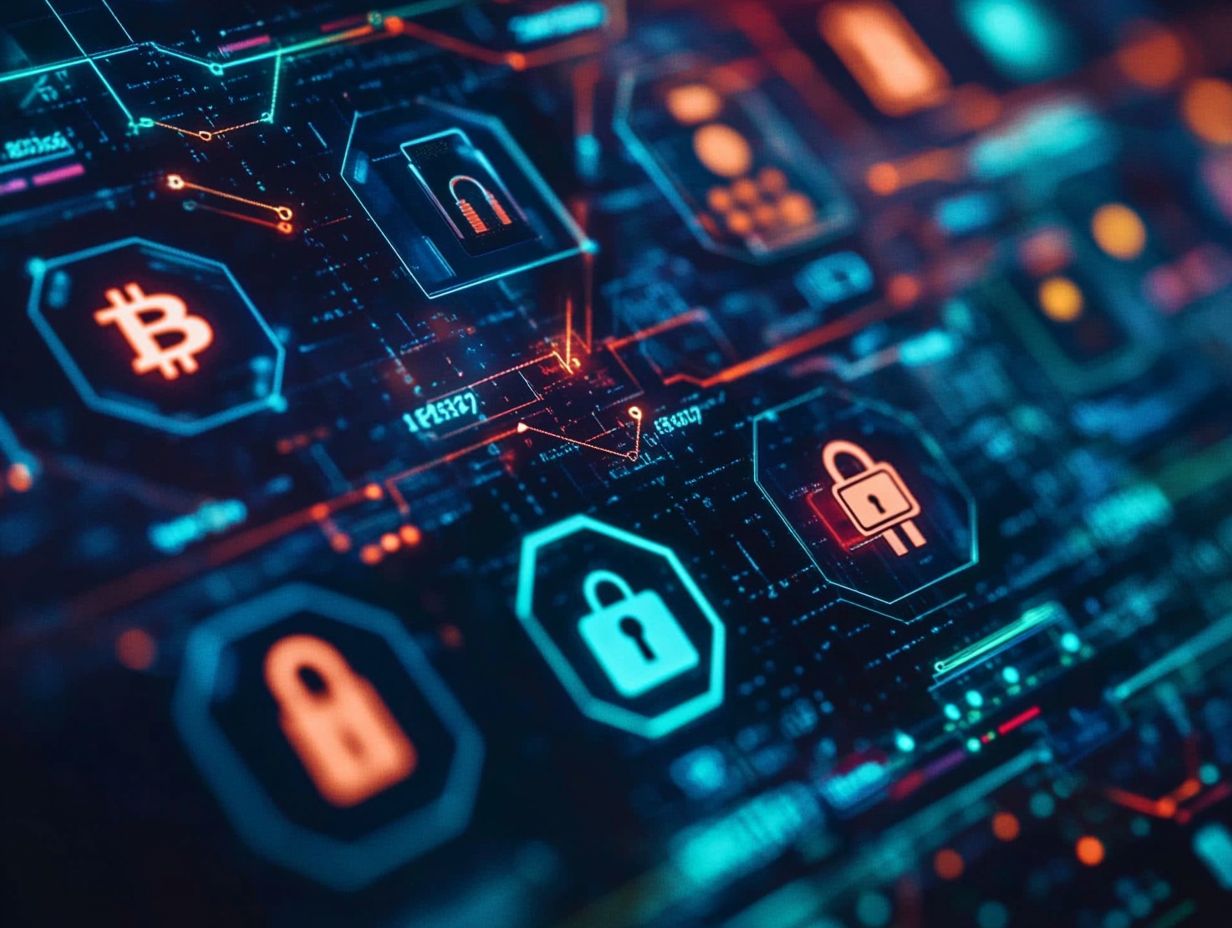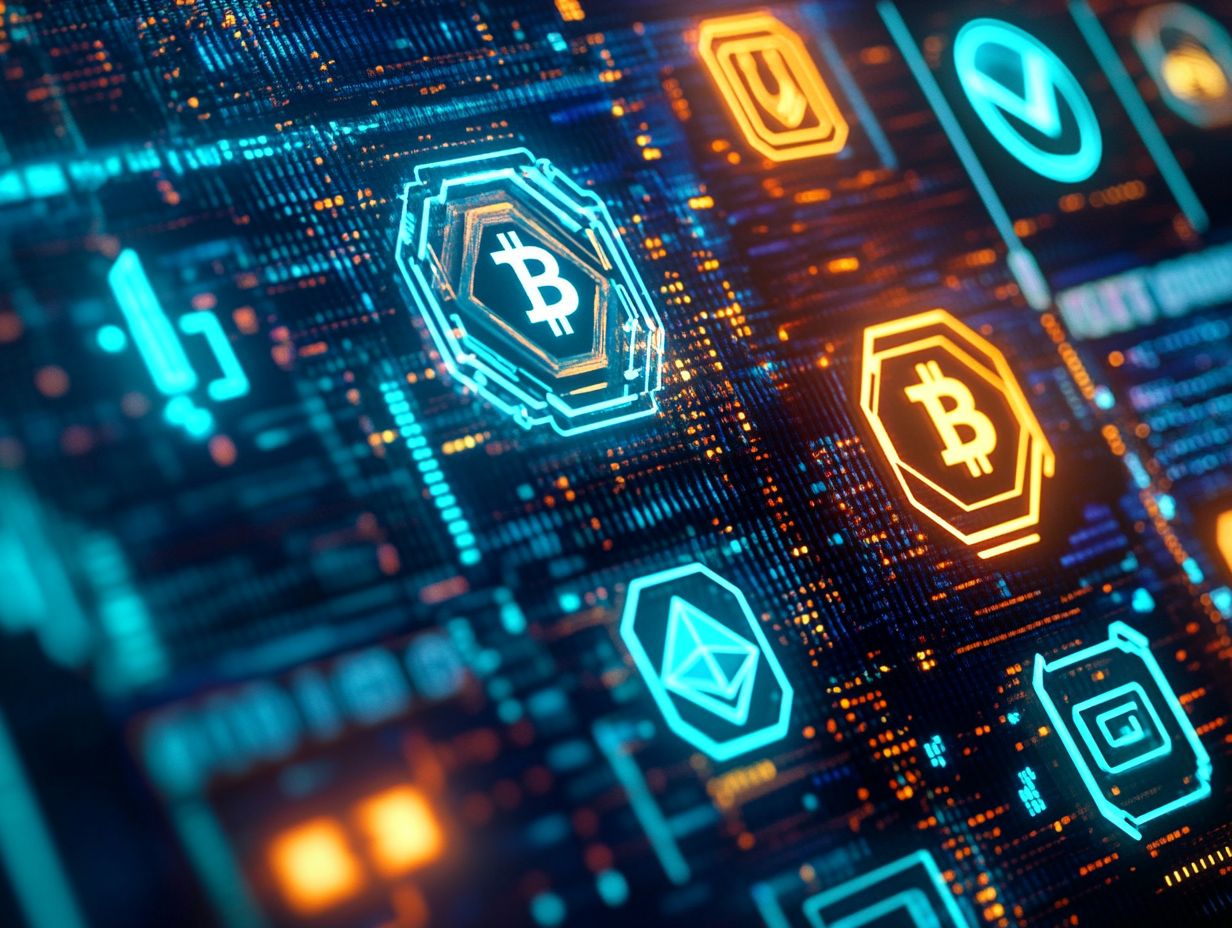Cryptocurrency Wallets: Types and Security Tips
In the ever-evolving world of cryptocurrency, understanding wallets is crucial for safeguarding your digital assets. This guide explores the different types of cryptocurrency wallets, including hot and cold options, as well as desktop, mobile, and paper choices.
When selecting a wallet, consider key factors such as security features and compatibility with various cryptocurrencies. You will learn best practices for securing your wallet and avoid common security pitfalls.
Get ready to navigate this digital landscape with confidence and safety!
Contents
Key Takeaways:

Cryptocurrency wallets come in different types, including hot and cold wallets, desktop, mobile, and paper wallets. To ensure you choose the right wallet type and protect your investments, it’s important to understand cryptocurrency security and stay safe in the digital world!
When choosing a wallet, consider security features and compatibility with different cryptocurrencies. To secure your cryptocurrency wallet, use strong passwords, enable two-factor authentication, and regularly back up your wallet. Avoid common risks like phishing scams, malware attacks, and social engineering.
What are Cryptocurrency Wallets?
Cryptocurrency wallets are essential tools for managing your digital assets, allowing you to store, send, and receive cryptocurrencies like Bitcoin securely.
Think of a wallet as your digital gateway to the blockchain network. You interact with your assets through unique identifiers, while secret keys give you the necessary authority to authorize transactions. This security infrastructure is vital; losing a secret key could lead to an irreversible loss of access to your funds.
The choice between custodial and noncustodial wallets significantly impacts your control over these assets.
Custodial wallets, managed by third parties, often prioritize convenience but may sacrifice your autonomy. In contrast, noncustodial wallets provide greater control but require you to manage your own security actively.
Wallets are also categorized as hot or cold. Hot wallets are connected to the internet and offer easy access, while cold wallets, stored offline, provide enhanced security against hacks.
Lastly, keep in mind that transaction fees play a critical role in the blockchain ecosystem, affecting how quickly your transactions are processed. This highlights the importance of selecting the right wallet type tailored to your specific needs.
Types of Cryptocurrency Wallets
Cryptocurrency wallets can be classified into several distinct types, each with its own set of advantages and drawbacks. It’s crucial to understand how to safely store your cryptocurrency to protect your assets effectively.
Software wallets, whether mobile applications or desktop clients, offer convenient access to your digital assets. In contrast, hardware wallets like Ledger and Trezor significantly enhance your security by keeping secret keys offline.
For those who prefer a more traditional approach, paper wallets are an option, while custodial wallets managed by cryptocurrency exchanges provide ease of use, albeit at the cost of personal control.
Understanding the differences between hot and cold wallets is vital for anyone looking to make informed decisions regarding their cryptocurrency investments.
Hot Wallets vs Cold Wallets
Hot wallets and cold wallets are essential categories of cryptocurrency wallets, each designed to meet your specific needs and security requirements.
Hot wallets, connected to the internet, offer convenience for frequent transactions, but they also come with a higher risk of security breaches and malware attacks. Cold wallets, on the other hand, store your assets offline, providing a fortress of security against online threats, making them ideal for long-term cryptocurrency holding.
By understanding these differences, you can make an informed choice on which wallet will best safeguard your digital assets. Security measures are crucial when managing your digital currencies.
Hot wallets typically appeal to traders and active investors who need quick access to their funds for seizing market opportunities. This ease of access, while beneficial, exposes you to cyber threats.
Conversely, cold wallets are favored by those who prioritize wealth accumulation over time, such as long-term investors looking to protect their assets from online risks. By grasping these distinctions, you can tailor your investment strategies effectively, ensuring your choices align with both your trading habits and security preferences.
Now that you know about wallets, start securing your assets today!
Desktop, Mobile, and Paper Wallets

There are three main types of cryptocurrency wallets: desktop, mobile, and paper. Each type caters to different user preferences and transaction habits.
Desktop wallets offer enhanced security features, such as two-factor authentication. However, they can be vulnerable to viruses if not well-maintained.
Mobile wallets provide the convenience of immediate access. They are great for quick purchases and transactions.
Paper wallets offer strong protection against digital threats. They are a robust storage option.
Understanding these options helps you choose a wallet that suits your cryptocurrency use and security preferences.
Factors to Consider When Choosing a Wallet
When selecting a cryptocurrency wallet, consider several critical factors to ensure the security and accessibility of your digital assets.
Security features should be at the forefront of your decision-making. Wallets equipped with enhanced protection measures can significantly minimize the risk of unauthorized access.
Additionally, compatibility with various cryptocurrencies is crucial, as some wallets may cater only to specific digital assets.
You can choose between custodial wallets, which manage your private keys for you, and noncustodial wallets, which give you full control over your assets.
Security Features
When selecting a cryptocurrency wallet, security features should be your top priority. A strong wallet uses several layers of protection.
For example, two-factor authentication adds an extra security step during logins. Multi-signature technology requires multiple keys to authorize a transaction, reducing vulnerability to unauthorized access.
By focusing on these security features, you can safeguard your cryptocurrency wallet from threats. The significance of private keys cannot be overstated; they are essential for securing your cryptocurrency holdings.
Wallets designed with strong security measures often use advanced encryption techniques to protect these keys from theft or loss. In contrast, wallets with weaker protocols could expose you to cyberattacks, risking devastating financial losses.
Carefully evaluate your options to make the best choice. The difference between a wallet that prioritizes security and one that doesn t can determine whether you manage your assets safely or expose yourself to unnecessary risks.
Compatibility with Different Cryptocurrencies
When choosing a cryptocurrency wallet, evaluating its compatibility with different cryptocurrencies is essential. This dictates the range of digital assets you can manage.
Make sure your wallet supports the digital assets you want to hold. This step is vital to avoid complications when managing or transferring your cryptocurrency.
The significance of compatibility goes beyond holding various digital currencies; it influences your overall user experience. A wallet that integrates seamlessly with multiple cryptocurrencies simplifies transaction processing.
For those with diverse portfolios, multi-currency wallets often emerge as the optimal choice. Relying solely on wallets with limited compatibility can lead to frustrating restrictions.
Choosing the right wallet can greatly improve how you navigate the world of cryptocurrencies!
Best Practices for Securing Your Cryptocurrency Wallet

Securing your cryptocurrency wallet is not just important it’s essential! Protect your digital treasures with these simple yet powerful practices.
Adopting best practices for securing your cryptocurrency wallet is paramount in safeguarding your digital assets from theft and unauthorized access.
Start by creating robust passwords that blend letters, numbers, and special characters. This is your first line of defense in fortifying wallet security.
Implementing two-factor authentication (2FA) adds an extra layer of protection. It makes it considerably more challenging for attackers to infiltrate your accounts.
Don t overlook the importance of regularly backing up your wallet. This ensures that you can recover your assets in the event of device failure or loss.
Creating Strong Passwords
Creating strong passwords is essential for securing your cryptocurrency wallet. Weak passwords can be an easy target for hackers.
Aim for a password that’s at least 12 characters long, incorporating a mix of upper and lower case letters, numbers, and special symbols. This complexity makes it far more difficult for attackers to access your digital assets without permission.
Consider using password managers to generate and securely store robust passwords. This further bolsters your wallet’s security.
Avoid the temptation to use easily guessable information like birthdays or common words. These can be quickly cracked through methods like phishing attacks.
Regularly updating your passwords every few months, for instance adds an extra layer of protection. It’s also wise to implement 2FA whenever possible, offering an additional safeguard against unauthorized access.
By following these guidelines, you can significantly reduce the risk of theft and keep your cryptocurrency holdings secure from intruders.
Using Two-Factor Authentication
Two-factor authentication (2FA) is a crucial security measure that fortifies your cryptocurrency wallets. It dramatically reduces the risk of unauthorized access.
By requiring you to provide a second form of verification like a code sent directly to your mobile device 2FA ensures that even if your password falls into the wrong hands, your account remains safeguarded.
Many wallets and exchanges now offer this feature, and it s strongly recommended for anyone managing significant amounts of cryptocurrency.
The significance of 2FA is paramount, especially in the unpredictable realm of digital assets. Security breaches can result in substantial financial setbacks.
There are various methods to implement this two-step process, each enhancing your security in unique ways:
- For example, SMS-based 2FA delivers a unique code to your phone.
- Authenticator apps, such as Google Authenticator or Authy, generate time-sensitive codes that are much harder for hackers to intercept.
- At an even higher security level, hardware tokens provide a physical device that produces one-time codes. This makes unauthorized access a far more difficult challenge.
By adopting these methods, you can significantly strengthen the defenses of your wallets against potential threats.
Backing Up Your Wallet
Backing up your cryptocurrency wallet is a critical practice that guarantees the recovery of your digital assets should you encounter device loss or failure. Most wallets offer options to create backup files or seed phrases words generated by your wallet that help you regain access.
It’s imperative to update these backups regularly, particularly after significant transactions or changes to security settings. This ensures that you always possess the most current recovery information.
Neglecting this essential security measure can lead to devastating losses. Forgotten or misplaced seed phrases can make accessing your funds impossible.
Familiarize yourself with your wallet s backup features. Consider keeping multiple copies in secure locations both physically and digitally.
Using encrypted storage for your digital backups is a wise choice. It s best to steer clear of cloud storage, as it can be susceptible to hacking.
Don t wait for a mishap to occur! Start backing up your wallet today to keep your assets safe. Establishing a comprehensive backup strategy isn t just a good idea; it s essential for protecting against unforeseen circumstances that could jeopardize your access to valuable assets.
Common Security Risks and How to Avoid Them

Common security risks associated with cryptocurrency wallets can present serious threats to you, making it crucial to understand how to avoid them effectively.
Phishing scams are rampant in the cryptocurrency landscape, where attackers masquerade as legitimate entities to snatch away your sensitive information. These scams often target unsuspecting users through deceptive emails or fraudulent websites.
Additionally, malware attacks can compromise your wallets, granting unauthorized access to your digital assets. By staying informed about these threats and implementing preventive measures, you can significantly bolster the security of your cryptocurrency holdings.
Phishing Scams
Protect your assets! Phishing scams pose a significant security threat for cryptocurrency wallet users, often exploiting trust to gain unauthorized access to your sensitive information. Attackers typically employ deceptive emails, counterfeit websites, or clever social engineering tactics to trick you into revealing your login credentials or private keys.
Are you aware of the tactics used in phishing scams? These scams can manifest in various forms, such as emails that appear to be from legitimate services, creating a false sense of urgency to pressure you into taking hasty actions. Fake cryptocurrency exchanges and wallet sites often mimic genuine platforms so closely that even the most vigilant among you might be deceived.
To safeguard against these threats, here s how you can protect yourself:
- Scrutinize URLs
- Enable two-factor authentication, a security method that requires two forms of identification
- Regularly update your security settings
Real-world examples, like the infamous Twitter hack of 2020, serve as stark reminders that even high-profile accounts can fall prey to phishing. This underscores the necessity of maintaining constant vigilance and adopting an informed approach to cybersecurity.
Malware Attacks
Malware attacks present a formidable threat to the security of your cryptocurrency wallets. Bad software can easily infiltrate your devices, gaining access to your private keys and sensitive information.
Beyond keyloggers and trojans, you should also be vigilant against ransomware, which can encrypt your files and demand payment in cryptocurrency for their release. Additionally, be cautious of phishing malware that tricks you into entering personal details on fraudulent websites.
The risks associated with these types of malware are substantial; a compromised wallet can lead to irreversible financial losses.
To safeguard against these dangers, it s crucial to employ strong, unique passwords, enable two-factor authentication, and regularly update your software. Using hardware wallets for long-term storage offers an extra layer of protection, keeping your assets safely away from malicious software.
Act now to secure your assets! Stay vigilant! Your financial safety depends on it.
Social Engineering
Social engineering is a clever tactic that attackers use to manipulate you into revealing confidential information. This poses a significant security risk for cryptocurrency wallet users.
Cryptocurrencies are becoming increasingly popular. Consequently, cybercriminals are using more advanced tactics. These attackers often resort to phishing emails that disguise themselves as official communications from legitimate cryptocurrency exchanges. They may also create fraudulent websites that mimic trusted platforms.
You must stay vigilant and cultivate a healthy skepticism toward unsolicited requests for your personal information. To mitigate risks, verify the authenticity of any communications by contacting the service provider through official channels.
Remember, the old adage “if it seems too good to be true, it probably is” rings especially true in the realm of digital finance. Keeping this in mind can help you safeguard your investments and navigate the complexities of the cryptocurrency world with confidence.
Frequently Asked Questions
What are cryptocurrency wallets and why do I need one?
Cryptocurrency wallets are digital wallets that store your private keys. Private keys are like the passwords to your digital money. Wallets allow you to send, receive, and manage your cryptocurrencies. They are essential because they provide a secure way to store your digital assets.
What are the different types of cryptocurrency wallets available?
There are four main types of cryptocurrency wallets: hardware wallets, software wallets, web wallets, and paper wallets. Hardware wallets are physical devices that store your private keys offline. Software wallets are apps or programs downloaded on your computer or mobile device. Web wallets are online wallets accessed through a web browser. Paper wallets are physical copies of your private keys printed on paper, allowing for offline storage.
How can I ensure the security of my cryptocurrency wallet?
Act now to secure your cryptocurrency wallet and protect your assets! Always use a reputable and trusted wallet provider. Enable two-factor authentication and use complex passwords. Consider using a hardware wallet for extra security, as they are not connected to the internet and are less vulnerable to hacking attempts.
Are there any risks associated with using cryptocurrency wallets?
As with any digital asset, there are risks involved. Cryptocurrency wallets can be vulnerable to hacking attempts, scams, and human error. It is essential to do thorough research before choosing a wallet provider and take necessary precautions to secure your wallet and private keys.
What should I do if I lose access to my cryptocurrency wallet?
If you lose access to your cryptocurrency wallet, you may not be able to recover your funds. That’s why it is crucial to keep your private keys safe and have backups. If you have a hardware wallet, you can restore your wallet using a recovery phrase. However, if you lose your recovery phrase and private keys, there is no way to regain access to your funds.
Can I have multiple cryptocurrency wallets?
Yes, you can have multiple cryptocurrency wallets for different purposes. For example, you can have a hardware wallet for long-term storage and a software wallet for daily transactions. It is essential to keep track of all your wallets and private keys to avoid confusion and potential loss of funds.
Stay informed and take control of your cryptocurrency journey!






